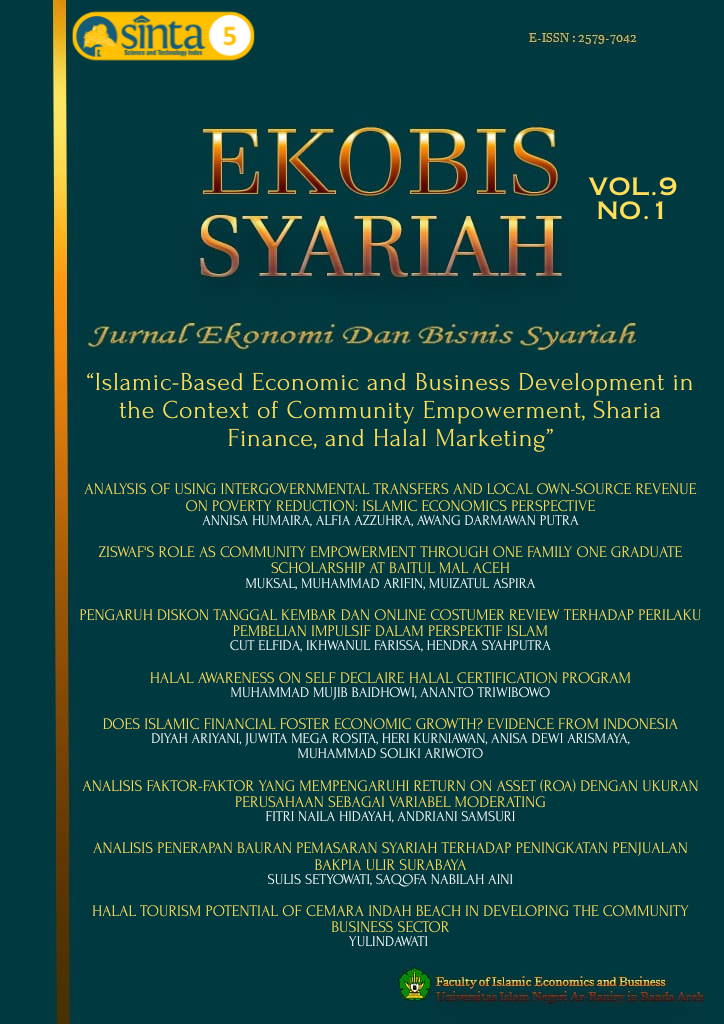Halal Awareness on Self Declaire Halal Certification Program
DOI:
https://doi.org/10.22373/e5ah0c73Keywords:
Halal Awarenes, Self Declare, Halal CertificationAbstract
The development of micro and small businesses in Indonesia is always increasing, so the role of the government is needed to supervise the products produced, both starting from the raw materials used, the manufacturing process to being ready to be distributed to consumers. Halal awareness or halal awareness is a basic thing and must be owned by business actors so that the products traded have guarantees in terms of process and law in accordance with the provisions of Islamic sharia. So that the implementation of Halal Awareness is considered important in the ongoing halal certification program. This study uses a qualitative descriptive method using primary and secondary data which is then analyzed using several processes, namely, First, data reduction. Second, the presentation of data, after the data reduction process, the data is presented in the form of a description. And third, draw conclusions. The results obtained show that halal awareness which includes the indicators of Halal Syar'i Awareness (Zattiyah), Halal Awareness Hygienic, Halal Safe Awareness (Security) and Halal Quality has a very important role so that business actors consciously understand how to apply halal to their products, and this is in line with the government's role in the ongoing self-declaration program.
References
prilia, Sifa, and Anita Priantina. 2022. ‘Analisa Strategi Peningkatan Sertifikasi Halal’. IJMA: International Journal Mathla’ul Anwar of Halal Issues 2(1).
Aziz, Yuhanis Abdul, Chok Nyen Vui, Abdul Aziz Yuhanis, and Nyen Vui Chok. 2012. ‘The Role of Halal Awareness and Halal Certification in Influencing Non-Muslims’ Purchase Intention’. In Proceedings of the 3rd International Conference on Business and Economic Research (3rd ICBER 2012) (March).
Ishak, Suraiya, Abd Hair Awang, Mohd Yusof Hussain, Zaimah Ramli, Sarmila Md Sum, Suhana Saad, and Azima Abd Manaf. 2016. ‘A Study on the Mediating Role of Halal Perception: Determinants and Consequence Reflections’. Journal of Islamic Marketing 7(3). doi: 10.1108/JIMA-02-2015-0010.
Jakiyudin, Ahmad Havid, and Alfarid Fedro. 2022. ‘SEHATI: PELUANG DAN TANTANGAN PEMBERIAN SERTIFIKASI HALAL GRATIS BAGI PELAKU UMK DI INDONESIA’. Al-Mustashfa: Jurnal Penelitian Hukum Ekonomi Syariah 7(2). doi: 10.24235/jm.v7i2.10666.
Maharani, Taradiva, and Nasobi Niki Suma. 2023. ‘Kesiapan Pelaku Usaha Terhadap Implementasi Program Sertifikasi Halal Gratis ( SEHATI )’. Psychospritual 2(1).
Oktavianna, Rakhmawati, Anis Syamsu Rizal, Benarda Benarda, Listya Sugiyarti, and Nur Asmilia. 2019. ‘Online Marketing Strategy in Improving Sales of Fish Cultivation in Jampang Village, Bogor [Strategi Pemasaran Online Dalam Meningkatkan Penjualan Pembudidaya Ikan Di Desa Jampang, Bogor]’. Proceeding of Community Development 2. doi: 10.30874/comdev.2018.199.
Othman, Baharudin, Sharifudin Md Shaarani, and Arsiah Bahron. 2016. ‘Evaluation of Knowledge, Halal Quality Assurance Practices and Commitment among Food Industries in Malaysia’. British Food Journal 118(8). doi: 10.1108/BFJ-12-2015-0496.
Rido, Muhammad, and Abdul Hadi Sukmana. 2021. ‘URGENSI SERTIFIKASI HALAL BAGI BISNIS UMKM’. JOURNAL of APPLIED BUSINESS and BANKING (JABB) 2(2). doi: 10.31764/jabb.v2i2.5644.
Sari, Desi Indah. 2019. ‘PERLINDUNGAN HUKUM ATAS LABEL HALAL PRODUK PANGAN MENURUT UNDANG-UNDANG’. Repertorium : Jurnal Ilmiah Hukum Kenotariatan 7(1). doi: 10.28946/rpt.v7i1.264.
Wahyuni, Tri, Miti Yarmunida, and Debby Arisandi. 2022. ‘Kesadaran Halal Masyarakat Terhadap Produk UMKM Makanan Di Kota Bengkulu’. Jurnal Ilmiah Universitas Batanghari Jambi 22(3):1376. doi: 10.33087/jiubj.v22i3.2473.
Yuana, Pusvita. 2021. ‘Perilaku Keuangan Individu Muslim Indonesia: Studi Data IFLS5’. E-Journal Ekonomi Bisnis Dan Akuntansi 8(1). doi: 10.19184/ejeba.v8i1.21525.
Downloads
Published
Issue
Section
License
Copyright (c) 2025 Muhammad Mujib Baidhowi, Ananto Triwibowo

This work is licensed under a Creative Commons Attribution-ShareAlike 4.0 International License.
EKOBIS allows the author(s) to hold the copyright and to retain the publishing rights without restrictions. Authors who publish with this journal agree to the following terms:
- Authors retain copyright and grant the journal right of first publication with the work simultaneously licensed under a Creative Commons Attribution License (CC-BY-SA 4.0) that allows others to EKOBIS the work with an acknowledgment of the work's authorship and initial publication in this journal.
- Authors are able to enter into separate, additional contractual arrangements for the non-exclusive distribution of the journal's published version of the work (e.g., post it to an institutional repository or publish it in a book), with an acknowledgment of its initial publication in this journal.
- Authors are permitted and encouraged to post their work online (e.g., in institutional repositories or on their website) prior to and during the submission process, as it can lead to productive exchanges, as well as earlier and greater citation of published work

